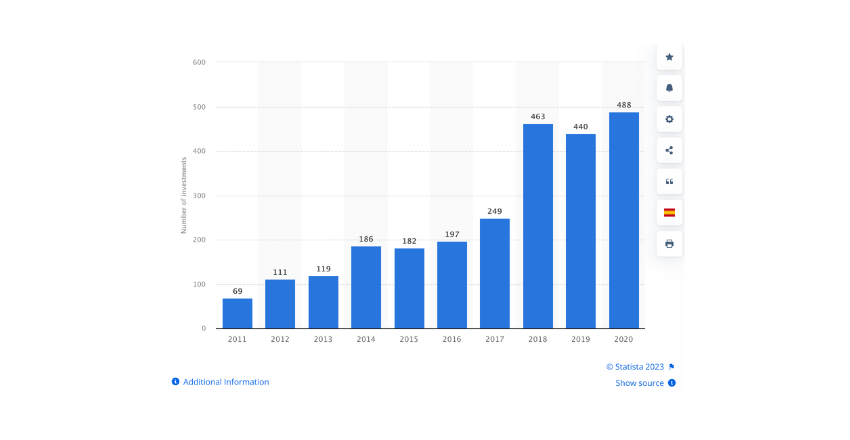
The benefits of working with a PHP Developer from Latin America include access to a vast pool of talented and cost-effective professionals, the convenience of similar time zones, cultural compatibility, and a rapidly evolving tech ecosystem.
Let me start with a bold yet compelling statement: The next frontier of global software development may well be Latin America, and it’s creating waves, particularly in the world of PHP development. But why is that?
This post will explain why Latin America is becoming a hotbed for PHP talent.
The Rising Significance of Latin American PHP Developers
Historically, regions such as North America, Europe, and Asia have dominated global software development.
Yet, Latin America is now quickly emerging as a critical player, presenting a dynamic and thriving tech ecosystem fueled by a surge in educational initiatives, an influx of foreign investment, and a rapidly growing IT sector.
PHP, a popular server-side scripting language, is one area where Latin American developers excel. Its flexible and efficient nature makes it a favorite among developers worldwide. So why is hiring a PHP developer from Latin America becoming a go-to strategy for many businesses?
Key Trends Shaping Latin America’s PHP Development Scene
Key Takeaways:
- Talent Availability and Quality: Latin America boasts a growing pool of skilled PHP developers, with high-quality education systems and coding boot camps providing a continuous flow of fresh talent.
- Cost-Effectiveness: Working with PHP developers from Latin America can be more cost-effective than their counterparts in North America and Europe without compromising quality.
- Convenient Time Zones: Similar time zones for businesses in North America make real-time collaboration and communication much more straightforward.
- Cultural Compatibility: Latin American developers often have a firm grasp of English and a cultural affinity with North American and European cultures, which smoothens communication and collaboration.
- Rapidly Growing Tech Ecosystem: Latin America has a rapidly evolving tech ecosystem with a solid commitment to technology education, growth in tech startups, and government support for the tech sector.
- Practical Recommendations: Building trust, leveraging language proficiency, understanding the work culture, and applying insider hacks such as using collaboration tools, providing clear project guidelines, offering ongoing learning opportunities, and recognizing good work can enhance the success of your partnership with Latin American PHP developers.
- Unique Developer FAQs: Latin American PHP developers are well-versed in agile methodologies, proactive in problem-solving and innovation, proficient in handling the security aspects of web development, comfortable with remote work, and often actively contribute to the open-source community.
Let’s delve deeper into each of these.
Talent Availability and Quality: The Secret Sauce of Latin American PHP Developers
Latin America’s high-caliber talent is no longer a secret in tech. However, understanding the depths of this talent pool and its unique advantages can give your business a distinctive edge. Here’s an inside scoop on what sets Latin American PHP developers apart.
Stellar Educational Background
Firstly, the region’s strong focus on educational and technological advancement cannot be overstated. Countries like Argentina, Brazil, and Mexico have full tech educational programs that graduate thousands of proficient developers each year, including those specialized in PHP.
For example, the Universidad Nacional Autónoma de México offers dedicated courses in PHP development, ensuring students are up to date with the latest practices in the industry.
Vibrant PHP Community

Latin America also boasts vibrant communities of PHP developers who regularly engage in meetups, conferences, and hackathons. Take, for instance, the PHP Conference Argentina, an event that draws PHP enthusiasts from all over the region.
These events allow developers to stay on top of industry trends and share best practices, improving their craft continually.
Real-World Experience
Many Latin American PHP developers have substantial practical experience under their belts, having worked on complex projects across diverse industries.
Case in point: Kaynes.com, a tech outsourcing company based in Brazil, has a robust roster of PHP developers who have worked on everything from intricate e-commerce websites to sophisticated enterprise applications.
Tips to Tap into this Talent Pool
Here are some hacks to successfully navigate this talent pool:
- Engage with local tech communities: To connect directly with these professionals, consider participating in local tech meetups and conferences in the region. Online platforms like Meetup and Eventbrite can help you find relevant events.
- Partner with regional recruitment agencies: Companies like Kaynes specialize in sourcing tech talent in Latin America. They understand the local talent landscape and can help you find PHP developers matching your needs.
- Leverage online hiring platforms: Websites such as Toptal, LinkedIn, or Stack Overflow can help you reach out to Latin American PHP developers. These platforms have a strong regional presence and can streamline your recruitment process.
Using these tips, you can take advantage of the rich talent pool in Latin America and reap the rewards.
Cost-Effectiveness: Maximizing Your Budget with Latin American PHP Developers

Budget constraints can often be a significant roadblock when hiring top-tier tech talent. This is where Latin America’s cost-effectiveness shines, offering world-class PHP developers at highly competitive rates.
Let’s delve into how this cost-effectiveness translates in absolute terms and how you can make the most of it.
Financial Advantage
PHP developers in Latin America typically charge lower rates than their counterparts in North America and Western Europe. This doesn’t reflect lower quality but rather the lower cost of living in these regions.
For instance, while a senior PHP developer in the U.S. might command an annual salary upwards of $100,000, a developer with similar skills and experience in countries like Argentina, Brazil, or Mexico may charge less than half of that amount.
Beyond Direct Costs
But the cost-effectiveness of hiring Latin American PHP developers isn’t limited to just salary expenses. Other factors include:
- Lower overhead costs as most developers are well-equipped to work remotely.
- Reduced training costs, thanks to the high level of expertise that these developers bring to the table.
Tips to Optimize Cost-Effectiveness
Here are some valuable hacks to help you maximize cost-effectiveness:
- Consider hiring remote freelancers: Developers who work remotely eliminate the need for office space, which can translate into substantial savings.
- Understand regional pay scales: Pay scales can vary widely across Latin America, so thoroughly understanding these differences can help you optimize your budget. For example, a PHP developer’s salary in Argentina may differ significantly from one in Colombia.
- Leverage cost-effective hiring platforms: Platforms like Upwork, Freelancer, and Toptal cater specifically to freelance PHP developers and can offer competitive rates.
Negotiate wisely: Many Latin American developers are open to negotiation. Partnerships thrive when expertise is respected and working within your budget.
By fully leveraging the cost-effectiveness of Latin American PHP developers, you can secure top-notch talent that drives your projects forward without breaking the bank.
Convenient Time Zones: Seamless Collaboration with Latin American PHP Developers
Coordinating across different time zones can often be a headache in remote work. The advantage of working with Latin American PHP developers is that the time difference is minimal or nonexistent for many companies—particularly those based in North America. Let’s dive into the details.
Time Zone Synergy
The bulk of Latin America operates in time zones that range from GMT-6 to GMT-3. For businesses in the United States, this translates into work hours that coincide or overlap significantly. This ease of synchronization greatly facilitates real-time collaboration and immediate communication.
To put this into perspective, when it’s 9 AM in New York (Eastern Standard Time), it’s also 9 AM in Bogota, Colombia, and 10 AM in Buenos Aires, Argentina. Compare this with a location like India, where the time difference can be upwards of 10 hours, making real-time collaboration more challenging.
Tips for Optimizing Time Zone Convenience
Here are some tips for maximizing the benefit of these convenient time zones:
- Schedule Regular Meetings: With fewer time zone constraints, regular team meetings become easier to schedule. Use this to foster open communication and stay up-to-date with project progress.
- Leverage Collaborative Tools: Tools like Slack, Trello, and Google Docs are great for real-time collaboration, and their effectiveness only increases when you’re operating in similar time zones.
- Take Advantage of Overlapping Work Hours: Use overlapping hours for tasks that require real-time collaboration and save independent tasks for other parts of the day.
- Consider Flexibility: Latin American developers are often open to flexible work hours, which can be leveraged to optimize productivity and fit into your schedule better.
Remember, the key to remote work is communication. When time zone differences are minimized, communication becomes more manageable, improving collaboration and successful project outcomes.
By leveraging Latin America’s convenient time zones, you’ll be able to maintain a smooth and efficient work process with your PHP developers.
Cultural Compatibility: The Undervalued Asset of a PHP Developer from Latin America
Cultural compatibility plays a crucial role in the success of a remote team, and it’s one area where Latin American PHP developers genuinely excel.
Businesses- particularly North American ones- with a shared history, similar societal norms, and often a common language—find a harmonious cultural fit with Latin American developers.
Let’s explore this in more detail.
Common Ground and Shared Values
Latin America and North America share a historical common ground. This fact has influenced these regions’ cultures, norms, and values. Latin American professionals often have a deep understanding of U.S. culture due to shared media, close geographical proximity, and frequent exchange of ideas.
This cultural similarity extends to the business world, leading to aligned work ethics and business practices.
Language Compatibility

Professionals in Latin America, especially in the tech sector, are highly proficient in English. Many Latin American countries emphasize English education, ensuring their tech professionals communicate effectively globally.
Tips to Enhance Cultural Compatibility
Here are some hacks to further enhance cultural compatibility with Latin American PHP developers:
- Invest in Team Building: Regular team building activities can strengthen bonds and enhance understanding. These could be as simple as virtual coffee breaks or structured activities like online workshops.
- Celebrate Cultural Differences: Each Latin American country has its unique cultural flavor. Celebrate these differences. For instance, acknowledge national holidays or ask your team members to share something special about their local culture.
- Practice Transparent Communication: A clear, open communication style is valued in Latin America. Regular updates and feedback help build trust and foster a comfortable work environment.
- Provide English Support if Needed: While many Latin American professionals are proficient in English, supporting continued learning can be valuable.
Cultural compatibility can significantly improve team cohesion and productivity, leading to successful projects. With Latin American PHP developers, this compatibility comes built-in, making it an invaluable asset for your team.
Rapidly Growing Tech Ecosystem: The Powerhouse of Latin America
The tech ecosystem in Latin America is experiencing explosive growth, making it an increasingly attractive hub for businesses seeking skilled PHP developers. Increased investment, innovative startups, and a strong emphasis on digital skills characterize this vibrant ecosystem. Let’s explore what this means for your business.
Rise in Investments and Tech Startups
Over the last decade, investments in Latin American tech companies have skyrocketed, and according to Statista venture capital “investments increased by over 600 percent in the last decade.”

This financial backing has fostered the rise of numerous tech startups, such as Brazil’s Nubank, Colombia’s Rappi, and Argentina’s MercadoLibre, further driving the demand for skilled PHP developers and making the region a hotbed of technological innovation.
Strong Emphasis on Digital Skills
The region’s governments and educational institutions are prioritizing digital literacy, churning out a new generation of tech-savvy professionals. Courses on digital skills, including PHP development, are increasingly common in regional universities.
Tips to Leverage the Tech Ecosystem
Here’s some advice on how to tap into the flourishing Latin American tech ecosystem:
- Engage with Tech Incubators and Accelerators: These organizations, such as Brazil’s Startup Farm or Argentina’s IncuBAte, are at the forefront of the tech scene and can be valuable sources of talent and partnerships.
- Stay Updated on the Startup Scene: Regularly check resources like LatAm List and Contxto for the latest news on the region’s startups, investments, and emerging technologies.
- Consider Strategic Partnerships: Collaborating with a local startup or tech firm can provide access to a rich talent pool and potentially open up new market opportunities.
- Participate in Local Tech Events: Whether online or in-person, these events provide networking opportunities and insight into the latest trends and innovations.
By harnessing the potential of Latin America’s rapidly growing tech ecosystem, your business can access cutting-edge ideas, technologies, and, most importantly, a rich pool of PHP developers ready to bring their expertise to your projects.
Practical Recommendations: Acing Your Partnership with a PHP Developer from Latin America
Having explored the manifold benefits of partnering with Latin American PHP developers, let’s focus on practical tips to ensure a smooth and productive collaboration.
Building trust and rapport is crucial when working with Latin American PHP developers, like in any partnership. Ensure you communicate clearly and regularly.
Please understand their working style and take the time to share your company culture and goals. Inclusivity goes a long way in making your developer feel part of the team.
Leveraging Language Proficiency
While many Latin American PHP developers have a high level of English proficiency, offering language support or even learning some Spanish phrases can be a nice gesture and help foster better relationships.
Understanding Work Culture

Understanding the work culture in Latin America can help avoid misunderstandings and enhance productivity. While the specifics can vary between countries, some common elements include a high value placed on relationships, a strong work ethic, and a flexible deadline approach.
Tips for a Fruitful Collaboration
To get the most from your Latin American PHP developers, follow these tips:
- Use Collaboration Tools: Tools like Asana, Jira, and Slack can help streamline project management and communication.
- Provide Clear Project Guidelines: To ensure your project’s success, provide your developers with clear and comprehensive project guidelines.
- Offer Ongoing Learning Opportunities: Providing opportunities for professional development can enhance your developers’ skills and increase their job satisfaction.
- Recognize Good Work: Regularly acknowledging the work and contributions of your developers can help boost morale and productivity.
By adopting these practical recommendations, you can effectively leverage the advantages of working with Latin American PHP developers and set your business up for successful outcomes in your tech projects.
Client Asked Questions
1. How has the PHP development landscape evolved in Latin America in recent years?
PHP remains a popular choice for web development, and many universities and coding boot camps in the region have incorporated it into their curriculum, contributing to a growing pool of skilled PHP developers.
2. How proficient are Latin American PHP developers in English?
English proficiency among Latin American PHP developers is generally high. English education is highly prioritized in many Latin American countries, particularly in the tech sector. Most developers can communicate effectively in English, both written and spoken.
3. What’s the average experience level of PHP developers in Latin America?
There’s a wide range of experience levels among PHP developers in Latin America. You can find junior developers, mid-level professionals, and senior developers with decades of experience. The region is known for its robust talent pool, which offers a blend of fresh perspectives and seasoned expertise.
4. How well-versed are Latin American PHP developers in other web development technologies?
Many PHP developers in Latin America also have proficiency in various other web technologies, such as JavaScript, HTML/CSS, and SQL, as well as frameworks like Laravel and Symfony. This multi-skilled talent pool can bring diverse perspectives to your projects.
5. How does working with a Latin American PHP developer compare to working with developers from other regions?
Every region has its unique strengths. Latin American PHP developers offer a competitive advantage in terms of cost-effectiveness, cultural compatibility, and convenient time zones for businesses, particularly in North America. The region’s rapidly growing tech ecosystem also ensures a steady supply of skilled PHP developers.
CEO Asked Questions
6. Are Latin American PHP developers familiar with agile methodologies?
Yes, most Latin American PHP developers are well-acquainted with agile methodologies, such as Scrum and Kanban. This familiarity enables them to seamlessly integrate into globally distributed teams and adapt to various project management styles.
7. How well do Latin American PHP developers adapt to new technologies and trends?
Latin American PHP developers are often quick to adopt new technologies and trends. They frequently participate in tech meetups, webinars, and open-source projects, which help them stay abreast of industry innovations. As such, they are well-equipped to tackle various tech challenges.
8. Do Latin American PHP developers have experience with remote work?
Yes, remote work has become common in Latin America’s tech industry, even before the COVID-19 pandemic. Many Latin American PHP developers are comfortable with remote work settings, making them well-suited for international collaborations.
9. What’s the typical work ethic of Latin American PHP developers?
Latin American PHP developers often bring a strong work ethic to their roles. They are known for their commitment, passion for coding, and solution-oriented approach. They also value open communication and teamwork, contributing to a positive work environment.
10. Do Latin American PHP developers usually hold any certifications?
While not all developers may hold certifications, it’s common for Latin American PHP developers to earn them. They might have credentials for specific PHP frameworks like Laravel or Zend or broader ones like ZCE (Zend Certified Engineer). Such certifications provide validation of their skills and expertise.
CTO Asked Questions
11. Can Latin American PHP developers handle large-scale, high-traffic applications?
Absolutely. Latin American PHP developers have been instrumental in developing and maintaining high-traffic websites and applications. Their training often includes handling complex, scalable architectures, which makes them suitable for large-scale projects.
12. How proactive are Latin American PHP developers in problem-solving and innovation?
Latin American PHP developers are typically proactive in both problem-solving and innovation. Their education and work culture fosters a mindset of continuous improvement and solution-oriented thinking. They are often encouraged to take ownership of their projects, enhancing their capability to think creatively and propose innovative solutions.
13. How equipped are Latin American PHP developers to handle the security aspects of web development?
Security is a fundamental aspect of web development; Latin American PHP developers are trained to be mindful of this. They are often well-versed in best practices for secure coding in PHP and regularly keep up-to-date with the latest security vulnerabilities and countermeasures.
14. How well does a PHP developer from Latin America work with cross-functional teams?
Working in cross-functional teams is becoming increasingly common in today’s tech landscape. Latin American PHP developers have shown great adaptability. Their strong communication skills and collaborative mindset make them valuable contributors in such environments.
15. Can a PHP developer from Latin America contribute to the open-source community?
Yes, many Latin American PHP developers are active in the open-source community. Latin America has numerous PHP conferences and meetups, reflecting a vibrant local community of developers who regularly contribute to open-source projects.
Wrapping Up about PHP Developer from Latin America
To sum it up, the benefits of working with a PHP developer from Latin America are clear: you gain access to a wealth of talent, cost-effectiveness, favorable time zones, cultural compatibility, and a cutting-edge tech ecosystem. It’s a compelling option for any business seeking to expand its software development capabilities.
Ashley is an esteemed technical author specializing in scientific computer science. With a distinguished background as a developer and team manager at Deloit and Cognizant Group, they have showcased exceptional leadership skills and technical expertise in delivering successful projects.
As a technical author, Ashley remains committed to staying at the forefront of emerging technologies and driving innovation in scientific computer science. Their expertise in PHP web development, coupled with their experience as a developer and team manager, positions them as a valuable resource for professionals seeking guidance and best practices. With each publication, Ashley strives to empower readers, inspire creativity, and propel the field of scientific computer science forward.



![How to use Cursor AI to write PHP Code[Example]](https://hirephpdeveloper.dev/wp-content/uploads/2025/03/How-to-use-Cursor-AI-to-write-PHP-Code-1-150x150.png)



